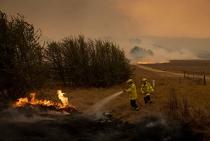The Pacific faces huge challenges should the world warm by 1.5 degrees Celsius by the early 2030s, warns an Australian climate change expert after a UN scientific report was released yesterday.
You are here
Results for greenhouse gases
Tuesday 10 August 2021
 Premium content
Premium content
Canberra, Australia
Thursday 2 May 2019
Stockholm, Sweden
The problem is staggering, even existential. Global emissions of greenhouse gases – especially carbon dioxide – are rapidly driving up global temperatures, transforming life as we know it. If those temperatures reach 2oC above pre-industrial levels, scientists warn, the results will be catastrophic. An international conference is called, under the auspices of the United Nations. Politicians declare that the world must curb CO2 emissions to avoid exceeding the 2oC threshold. And then nothing substantial happens. By Mats Persson.
Wednesday 29 August 2018
Paris, France
There is unprecedented global momentum to build a low-carbon, climate-secure future. However, in fact, greenhouse gases in the atmosphere are still accumulating at a rate that will soon take us well above the 1.5°C threshold, beyond which some of the worst effects of climate change cannot be staved off. Extreme weather already is becoming more common, as exemplified by record-high temperatures worldwide this year. On current trends, average global temperatures could well rise by 3°C, imperiling vital natural systems like coral reefs, rainforests, and the polar regions. All relevant stakeholders need to strengthen their climate commitments. By Patricia Espinosa and Anne Hidalgo
Tuesday 18 October 2016
 Premium content
Premium content
Kigali, Rwanda
An important agreement to an amendment in the Montreal Protocol was signed by almost 200 countries last week in Kigali, Rwanda, to phase down hydrofluorocarbons (HFCs) usage and production, which could stop a 0.5 °C rise in temperature by the end of the century.






